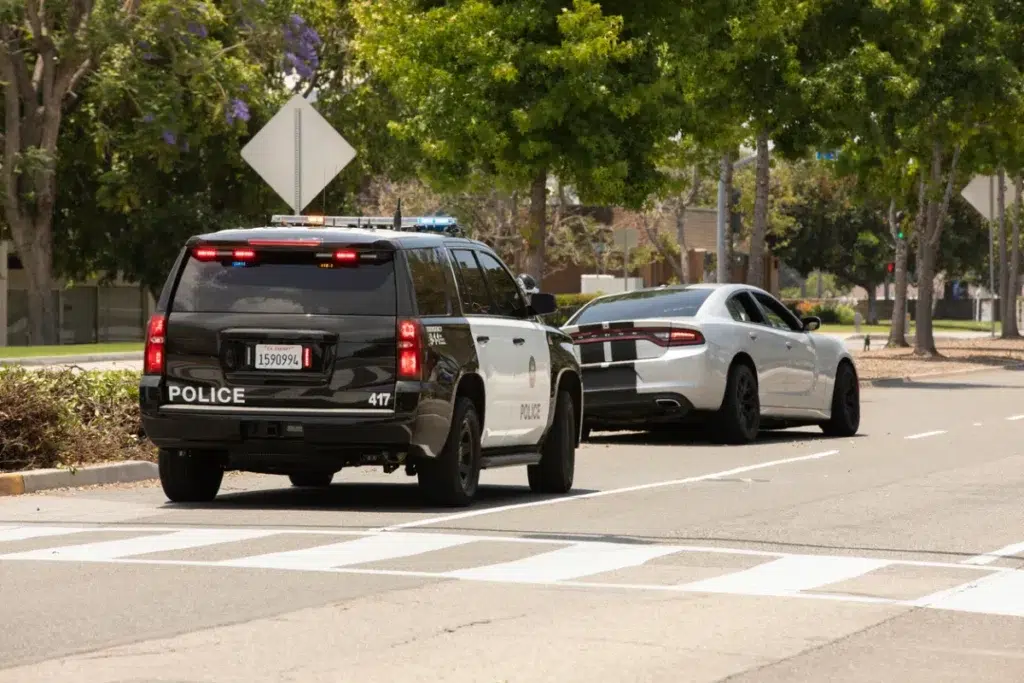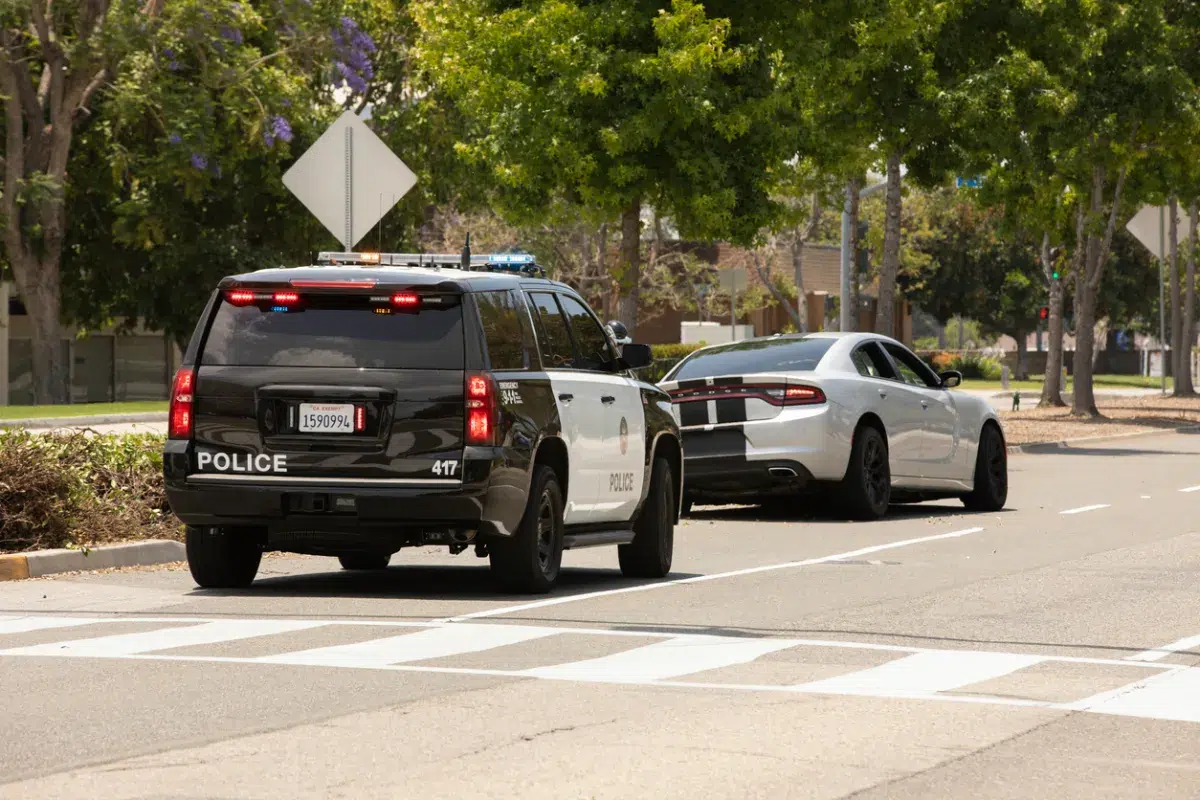
California enforces strict laws against underage drinking and driving, including the zero-tolerance law. For drivers under 21, even a small amount of alcohol can lead to immediate and lasting penalties. At Gressley & Donaldson, we defend DUI cases across California and understand how these charges affect both DMV records and court outcomes.
In this guide, we explain what happens when an underage driver is charged with driving under the influence, the penalties involved, and the steps that can help protect your rights and your future.
Understanding California’s Zero Tolerance DUI Laws for Under-21 Drivers
California’s zero-tolerance rule is set by Vehicle Code Section 23136. If you are under 21 and your blood alcohol content is 0.01% or higher, the DMV can suspend your license, even if your driving did not look impaired. Officers typically use a Preliminary Alcohol Screening device, commonly referred to as a PAS, at the roadside.
For adults, the legal limit is 0.08% under VC 23152(b). For under-21 drivers, the threshold is far lower, which means even mouth alcohol from certain medicines can cause a problem. The takeaway is simple: any measurable amount of alcohol can lead to real penalties and may be classified as a criminal offense.
This zero-tolerance standard is directly tied to DMV action, which moves quickly after an arrest or detention. Now, let’s look at the penalties that can follow.
Criminal and Administrative Penalties for Underage DUI in California
California separates underage DUI cases into two tracks: administrative penalties from the DMV and criminal penalties through the court. Both can apply to the same incident, and they operate on different timelines. Understanding how these systems interact is the first step to protecting your record and your restricted license.
1. The Laws That Apply
Underage drivers can face several different Vehicle Code sections depending on their blood alcohol concentration (BAC) and the officer’s observations:
- VC 23136 – Zero Tolerance: Applies to drivers under 21 with a BAC of 0.01% or higher. This is an administrative action handled by the DMV, not a criminal court case.
- VC 23140 – Under-21 DUI: Covers drivers under 21 with a BAC of 0.05% or higher. This is an infraction that carries fines and education requirements.
- VC 23152 – Standard DUI: Used when the BAC is 0.08% or higher, or when the officer claims impairment. This is charged as a misdemeanor and brings the same penalties adults face for a first DUI.
2. Administrative (DMV) Penalties
The DMV handles administrative actions under the Administrative Per Se (APS) program. Even if no criminal charges are filed, the DMV can still suspend a license for any measurable alcohol in the system.
- License suspension: A one-year suspension for a 0.01% BAC or higher, or for refusing a chemical test.
- Refusal penalties: Refusing a test can result in a suspension lasting from one to three years, depending on the individual’s prior history.
These suspensions start quickly unless a DMV hearing is requested within ten days of the notice, during which you may hold a temporary license.
3. Criminal Penalties in Court
If the case also goes through the court system, penalties depend on the statute charged:
- VC 23140 (Under-21 DUI, 0.05% or higher): A fine of around $100 and a three-month alcohol education program if the driver is 18 or older.
- VC 23152 (Standard DUI): Fines between $390 and $1,000, three to five years of probation, mandatory DUI school, and possible jail time up to six months for a first offense.
- Aggravating factors: Prior DUIs, test refusals, or high BAC levels can result in increased penalties, including longer suspension periods or the requirement of an ignition interlock device.
4. How DMV and Court Cases Interact
It is important to remember that the DMV case is separate from the criminal case. You can win one and still lose the other. For example, even if a court dismisses the DUI charge, the DMV can still uphold a license suspension if its hearing officer believes the BAC test was valid.
5. Common Penalty Scenarios
| Law | BAC Trigger | Type | Typical First-Offense Outcome |
| VC 23136 – Zero Tolerance | 0.01% or higher | DMV administrative | 1-year license suspension. Test refusal can result in a 1–3 year suspension, depending on the individual’s history. |
| VC 23140 – Under-21 DUI | 0.05% or higher | Infraction | $100 fine, 1-year suspension, and a 3-month alcohol education program if 18 or older. |
| VC 23152 – Standard DUI | 0.08% or impairment | Misdemeanor | Fines $390–$1,000, probation, DUI school, up to 6 months jail in some cases, and license suspension. |
Understanding which law applies to your case determines what kind of defense strategy works best and what timelines must be met.
Driver’s License Suspension and Restricted Driving Privileges in California DUI Cases
After an arrest or detention, officers often take your license and hand you a pink Suspension or Revocation Order and Temporary Driver’s License, called DS 367 or DS 367M, following a preliminary alcohol screening test. That temporary paper allows you to drive for 30 days, unless another action is already on your record.
You have only 10 days to request a DMV administrative hearing. If you miss that window, the suspension will start after the 30-day temporary license expires. At the hearing, a hearing officer reviews the evidence, and you can present documents and witnesses.
Some under-21 drivers can request a restricted hardship license, also known as a critical need license, under VC 13353.8. That option is limited, and it is not available for refusal suspensions. In some instances, the DMV may require an ignition interlock device, commonly referred to as an IID, before any driving is permitted, as well as participation in a mandatory alcohol education program.
Now that we have covered the short-term fallout, let’s talk about what follows you long after the case is closed.
Long-Term Consequences of a DUI Conviction for Underage Drivers
A DUI at a young age can have consequences that last long after the court case or DMV suspension ends. Beyond fines and temporary restrictions, a conviction can affect your education, career opportunities, finances, and reputation for years to come. Understanding these long-term effects helps you make better decisions early, especially for first-time offenders, and protect your record as much as possible.
1. Impact on Education and Scholarships
Colleges and universities often review disciplinary or criminal histories when considering applicants for admission, housing, and scholarships.
- Admissions and conduct reviews: Many schools ask about DUI arrests or convictions as part of their application or disciplinary policies.
- Scholarships and campus housing: Financial aid programs and housing offices may view a DUI as a conduct violation, especially when tied to alcohol use.
A single mistake can create additional questions during applications or require disclosure forms that slow down the admissions process.
2. Insurance and Financial Consequences
Insurance companies treat underage DUIs as serious high-risk events, particularly in cases of drunk driving. After a conviction or license suspension:
- Premium increases: Auto insurance rates can rise sharply, or policies may be canceled altogether.
- SR-22 requirement: Most drivers are required to file an SR-22 form for a period of three years to prove financial responsibility. Failing to maintain it can result in another suspension.
- Long-term cost: Higher premiums and reinstatement fees can add up to thousands of dollars over time.
3. Employment and Career Limitations
Even for a first offense, a DUI can appear on background checks and professional licensing applications.
- Job applications: Some employers, especially those in fields such as driving, law enforcement, or education, may deny employment based on a DUI record.
- Professional licenses: Nursing, teaching, real estate, and commercial driving licenses can all be affected by alcohol-related convictions.
- Internships and the military: Recruitment programs and security screenings often disqualify applicants with unresolved or recent DUI histories.
Taking legal action early to reduce or dismiss a charge can make a significant difference for your future opportunities.
4. Personal and Social Effects
The emotional and social fallout from a DUI can be just as challenging as the legal penalties.
- Family strain: Parents or guardians may face higher insurance costs or restrictions tied to a minor’s driving record.
- Social stigma: Young drivers often feel isolated or judged after a DUI case becomes known among peers or community members.
- Transportation barriers: Losing the ability to drive can affect school attendance, part-time work, and family responsibilities.
5. Protecting Your Record and Moving Forward
Although the consequences are serious, they do not have to define your future. Early legal intervention can help:
- Challenge or seal records through expungement if eligible.
- Negotiate reduced charges that carry fewer long-term effects.
- Show rehabilitation through alcohol education, counseling, or volunteer work.
A proactive approach shows responsibility and can help limit the damage to your record, finances, and reputation, especially when dealing with an alcohol-related offense.
Defenses Available to Under-21 Drivers Facing DUI Charges in California
Every underage DUI case is different. The right defense depends on what the officer observed, how the stop occurred, and how chemical testing was handled. At Gressley & Donaldson, we examine every detail of the case from the traffic stop to the final report. Even small procedural mistakes or testing issues can result in a reduced charge, dismissal, or a victory at the DMV hearing.
1. Challenging the Stop and Investigation
The foundation of any DUI case is whether the officer had a lawful reason to stop the vehicle.
- If the stop was made without probable cause or reasonable suspicion, any evidence collected afterward may be thrown out.
- Officers must also follow specific steps when detaining a driver, reading implied consent warnings, and requesting a test.
A motion to suppress based on an unlawful stop can often change the course of the case before the trial begins.
2. Questioning the Accuracy of the PAS or Chemical Test
Underage DUI arrests often rely on Preliminary Alcohol Screening (PAS) devices or chemical breath tests. These tools are not perfect.
- Calibration and maintenance: Devices must be regularly checked and documented to ensure optimal performance. Missing logs can invalidate results.
- Mouth alcohol and contamination: Residual alcohol from mouthwash, medication, or reflux can inflate readings.
- Testing procedures: Officers must observe the driver for 15 minutes before testing to ensure accuracy.
When these rules are not followed, an attorney can challenge the reliability of the BAC results in both court and DMV hearings.
3. Identifying Procedural or Administrative Errors
California’s Title 17 regulations set out strict requirements for collecting, handling, and testing breath and blood samples. Any deviation can be grounds to contest the evidence.
Common procedural issues include:
- Improper labeling or chain of custody for blood samples
- Incomplete reports or unsigned certifications
- Incorrect DMV paperwork, which can affect the validity of the suspension notice
These technical defenses can be especially effective in DMV hearings, where officers must prove each step was done correctly.
4. Disputing Officer Observations and Testimony
Underage DUI arrests sometimes rely heavily on the officer’s subjective interpretation of driving or behavior. Signs like “red eyes” or “odor of alcohol” can be misleading and often have innocent explanations, such as fatigue or allergies.
Criminal Defense attorneys can counter this testimony with:
- Video footage from dash or body cameras
- Witness statements from passengers or bystanders
- Expert testimony explaining alternate causes of symptoms
Challenging perception-based claims helps show that impairment was not proven beyond a reasonable doubt.
5. Motions and Negotiation Strategies
An experienced Riverside DUI attorney can file pretrial motions to suppress evidence, contest license suspensions, or negotiate for lesser charges such as “wet reckless” or infraction-level offenses under VC 23140. These outcomes can reduce or eliminate county jail exposure and help preserve your record for the future.
6. Parallel Defense at the DMV
DMV administrative hearings run separately from the criminal court case. A win at the DMV can save your driving privileges even if the court case continues.
At these hearings, attorneys focus on three core issues:
- Whether the officer had a lawful reason to detain or arrest you.
- Whether the PAS or chemical test was conducted properly.
- Whether the BAC results were 0.01% or higher.
Each of these points can be contested through evidence, testimony, or procedural arguments.
Support, Education, and Recovery Resources for Young Drivers in California
Judges and hearing officers want to see growth and responsibility. Taking steps early can help both your life and your case. Many clients benefit from counseling and youth-focused alcohol education.
- Programs and counseling: State-licensed DUI schools, campus counseling centers, and community providers offer age-appropriate classes and support.
- Community resources: SAMHSA’s National Helpline and local teen programs connect you to treatment, family therapy, and peer support.
- Insurance and SR-22: After a suspension, most drivers are required to file an SR-22 and maintain it on file for a period of three years to reinstate their license and continue to be insured.
We can point you to reputable providers who hold a legitimate liquor license and help you time each step so that the paperwork aligns with your court and DMV dates.
Additional Resources and Support
You can find plain-language information on the California DMV website about APS suspensions, hearing rights, and reinstatement steps for an underage driver’s license. The site also links to Driver Safety Offices and forms for critical need licenses.
- Alcohol education programs are available statewide, including three-month classes for VC 23140 and longer programs for standard DUI.
- DMV and law enforcement agencies provide pamphlets and online pages explaining underage BAC limits, PAS testing, and hearing deadlines.
- Insurance carriers can guide you through SR-22 filings, discuss the impact on premiums, and explain the reinstatement timing.
If you feel overwhelmed, that is normal. A brief phone call with our team can clarify the next steps and when to take them.
Take Action Now: Protect Your Record and Your Future
A DUI conviction at a young age can affect your education, job prospects, and financial stability for years to come. At Gressley & Donaldson, we understand what’s at stake and move quickly to protect your rights.
Call 951-319-3199 or visit our Contact Us page to schedule a confidential consultation. Our attorneys will review your case, explain your legal options, and work to minimize the lasting effects of a DUI conviction.




